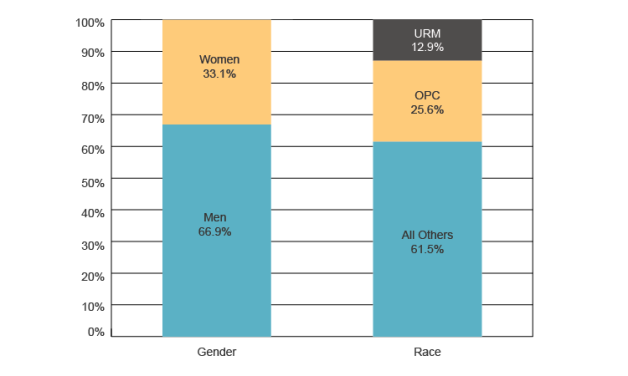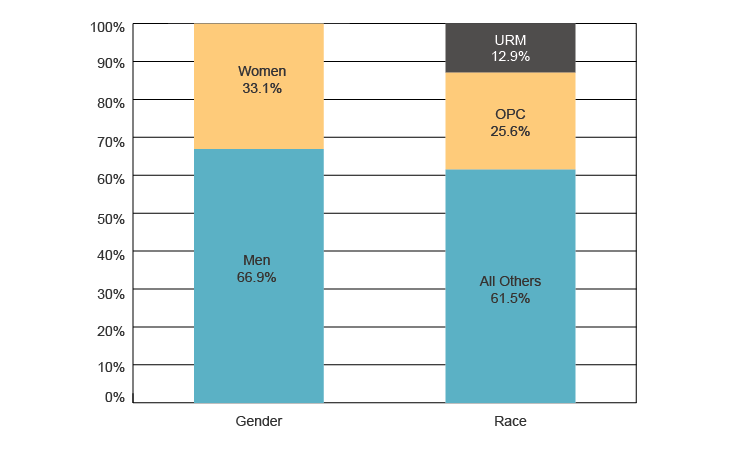The U.S. Department of Energy’s Lawrence Berkeley National Laboratory (Berkeley Lab) has launched a major initiative to foster a more diverse and inclusive workforce. The move comes as recent workforce data shows that women and minorities have not made significant gains at the Lab in the last decade.
As of October 10, 2014, women accounted for 16 percent of the Lab’s research scientists and engineers and 33 percent of its total workforce. Underrepresented minorities (Black, Hispanic, and Native American) accounted for 4 percent of the research scientists and engineers and 13 percent of the total workforce.
“I take this very seriously because we want to have the best workforce possible, within both our scientific teams and our support teams,” said Lab Director Paul Alivisatos. “Bringing in a more diverse workforce will simply make us a more effective laboratory as we try to solve some of the most difficult problems in science and energy.”
Berkeley Lab’s support staff, which makes up about half of the total employees, is moderately more diverse than the scientific staff, with women accounting for 44 percent of employees and ethnic minorities accounting for 44 percent. Overall, of the Lab’s 3,108 career, term, and postdoctoral employees, 33 percent are women, 13 percent are underrepresented minorities, and 26 percent are other people of color (which includes people of Asian, Middle Eastern, Southwest Asian, North African, and Pacific Island heritage). More complete data by job category can be found here.

URM: underrepresented minorities (African American/Black, Hispanic/Latino, American Indian/Alaskan Native). OPC: other people of color (Asian/Asian American, Middle Eastern/Southwest Asian/North African, Pacific Islanders). The data includes only career, term, and postdoctoral employees, as of October 10, 2014. There are a total of 3,108 employees.
“An important component of our new Diversity and Inclusion Initiative is to review recruiting, hiring, and promotion processes to make sure they conform to best practices,” said Chief Human Resources and Diversity Officer Vera Potapenko. “That includes ensuring that search committees are aware of issues around implicit bias and are reaching as broad and inclusive a candidate pool as possible.”
Alivisatos added: “We want to make sure all of our searches are done much more systematically. I think that can be very impactful, especially if we are proactive in reaching out and spreading the word that Berkeley Lab is a great place to work to diverse groups all around the country, particularly at minority-serving institutions of higher education.”
The Initiative will also review issues around work-life balance, family-friendly policies, and equitability. Additionally, Berkeley Lab will address the “pipeline” issue by enhancing its outreach activities and educational opportunities. “There are many reasons for the so-called leaky pipeline, where women and minorities tend to drop out of the STEM (science, technology, engineering, and math) fields at each step along the way, from high school all the way through the PhD and beyond,” said Potapenko. “We are taking a look at what we can do to begin changing those trends. We expect this to be a long-term project.”
STEM education and outreach has always been a cornerstone of Berkeley Lab’s mission. Every year hundreds of students and dozens of high school teachers and college professors participate in programs offered by the Lab’s Workforce Development & Education Office. The Diversity & Inclusion Initiative aims to build on these programs, engaging especially with minority-serving institutions.
Additionally, as a member of the Executive Committee of the National Laboratory Directors Council, Alivisatos is addressing this issue with his counterparts at other DOE national labs. “As a nation, a diverse, educated workforce is critical to fulfilling our energy and environment needs. The national labs consider it essential for our country’s future to inspire and prepare the next generation of scientists and engineers.”
To learn more about diversity and inclusion at Berkeley Lab, visit diversity.lbl.gov.
# # #
Lawrence Berkeley National Laboratory addresses the world’s most urgent scientific challenges by advancing sustainable energy, protecting human health, creating new materials, and revealing the origin and fate of the universe. Founded in 1931, Berkeley Lab’s scientific expertise has been recognized with 13 Nobel prizes. The University of California manages Berkeley Lab for the U.S. Department of Energy’s Office of Science. For more, visit www.lbl.gov. DOE’s Office of Science is the single largest supporter of basic research in the physical sciences in the United States, and is working to address some of the most pressing challenges of our time. For more information, please visit science.energy.gov.
